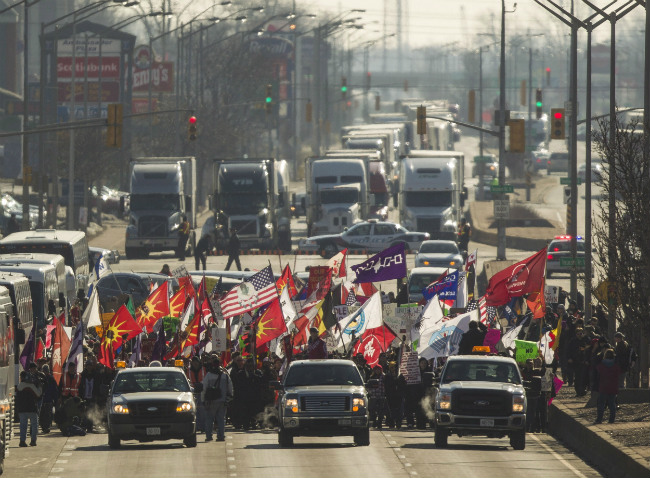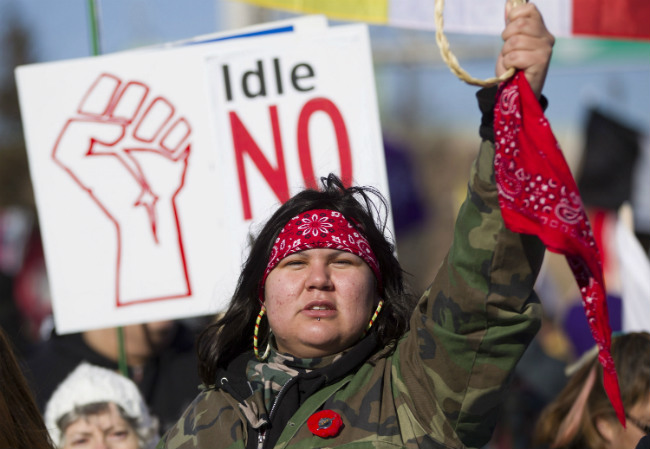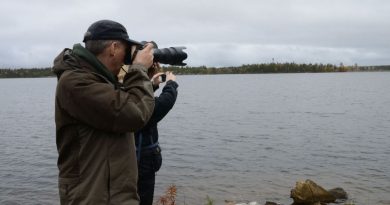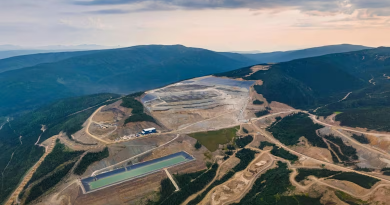Idle No More protesters block rail traffic, slow border crossing
First Nations demonstrators stopped railway traffic lines between Toronto, Ottawa and Montreal this afternoon, while others stalled major highways and rail lines in parts of Manitoba, Alberta, New Brunswick and Ontario as part of the Idle No More Movement’s national day of action.
Protesters also gathered at in Windsor, Ont. near the Ambassador Bridge to Michigan, slowing down traffic to North America’s busiest border crossing for several hours, the CBC’s Allison Johnson reported.
Activities including rallies, possible blockades and prayer circles were planned across the country Wednesday as part of the grassroots movement calling for more attention to changes that were contained in Bill C-45, the Conservative government’s controversial omnibus budget bill that directly affected First Nations communities.
Aboriginal leaders say there has been a lack of consultation on changes to environmental protection regulations.
Idle No More protesters set up a blockade east of Toronto, halting railway traffic between Toronto, Ottawa and Montreal, VIA Rail said. The demonstration blocked traffic between Belleville, Ont., and Kingston, Ont., Wednesday afternoon.
 Traffic slowed at Ambassador Bridge
Traffic slowed at Ambassador Bridge
Meanwhile, area traffic near the Ambassador Bridge was slowed Wednesday afternoon, Johnson reported.
The bridge is a key border crossing for trade between Canada and the U.S., she added, with roughly 10,000 trucks crossing daily.
“Any flow of traffic stoppage is a pretty big deal, [but] we are told that is not the goal here today,” she reported from Windsor.
Organizers say it was an “economic slowdown” and “not a blockade.”
“We don’t want to inconvenience people too much, but we want to be in places that are going to get us noticed and allow us to get our information out,” said organizer Lorena Garvey-Shepley.
Elsewhere in Ontario, Idle No More protesters set up a blockade near Highway 6 and Caledonia Bypass, according to CUPE.
In Toronto, demonstrators gathered in the downtown core near the British consulate. And in downtown Ottawa, crowds gathered outside World Exchange Plaza near Parliament Hill for a round dance. Traffic was rerouted this afternoon.
|
Here is a partial overview of some of the Idle No More activities expected in several cities today (all times listed are local):
|
Calgary-Edmonton highway blocked
In Alberta, a few dozen activists blocked traffic on QEII, which connects Calgary and Edmonton, this afternoon near Gateway Park, the CBC’s Briar Stewart reported. However, demonstrators from the Papaschase First Nation have begun letting some vehicles through slowly.
In Manitoba, Idle No More protesters gathered outside of the Manitoba Legislature this afternoon. About an hour west of the city, protesters blockaded a railway line near Portage la Prairie, the CBC’s Angela Johnston reported.
About 15 demonstrators, led by former Roseau River First Nation chief Terry Nelson, waved placards at a freight train early Wednesday morning, then took over the crossing, forcing another train to be halted by police at the scene. Service was stopped as of noon local time on the blocked rail line, which CN Rail spokesman Jim Feeny described as a “critical link” in its network.
CN Rail has since obtained a court injunction to deal with the blockade, which it says is illegal.
“We are taking the necessary steps to protect our employees, customers and facilities,” Feeny told CBC News. “We have stopped train traffic in the immediate area and have obtained a court injunction.”
March across N.B. bridge in Miramichi
 In New Brunswick, hundreds of demonstrators marched across a bridge this afternoon along a major highway in Miramichi, the CBC’s Jennifer Choi reported.
In New Brunswick, hundreds of demonstrators marched across a bridge this afternoon along a major highway in Miramichi, the CBC’s Jennifer Choi reported.
RCMP officers blocked the entranceways to Miramichi bridge from either direction as roughly 200 to 300 protesters marched, stalling traffic for nearly 2.5 hours, nearly she added.
While many of the protests Wednesday were peaceful, Grand Chief Derek Nepinak of the Assembly of Manitoba Chiefs said he worries some protesters might take things too far.
“I think it’s very important to recognize that we do not, at this time, condone the use of any kind of force,” Nepinak said.
“We can’t win in any kind of environment where we’re using force.”
Other chiefs said they will be peaceful today, but if nothing changes to improve First Nations conditions, blockades will follow.
“At this time we have no plans to organize or facilitate the organization of roadblock on Highway 63 for Jan. 16 or any set date,” said Chief Allan Adam of the Athabaska Chipewyan First Nation, referring to the northern Alberta highway to the oilsands region.
“However, the people are upset with the current state of affairs in this country and things are escalating towards more direct action.”
Prime Minister’s Office has no plans to revisit bill
First Nations activists are also planning a demonstration in front of the Canadian High Commission in London in the U.K. on Thursday.
A key demand of the protesters and chiefs alike is for the government to back down on changes to environmental oversight in two recent omnibus bills.
“The complete gutting of all environmental approval, regulatory and enforcement mechanisms in Canada … mean that the reassertion of aboriginal and treaty rights are the last best hope to protect both First Nations’ and Canadians’ water, air and soil from being poisoned forever by big oil and mining corporations,” said Clayton Thomas-Muller from the Canadian Indigenous Tar Sands Campaign.
The government opposes any changes.
Andrew McDougall, Prime Minister Stephen Harper’s spokesman, said: “The government has no plans to reconsider its legislation.”
With files from The Canadian Press
For more stories from CBC News, click here




